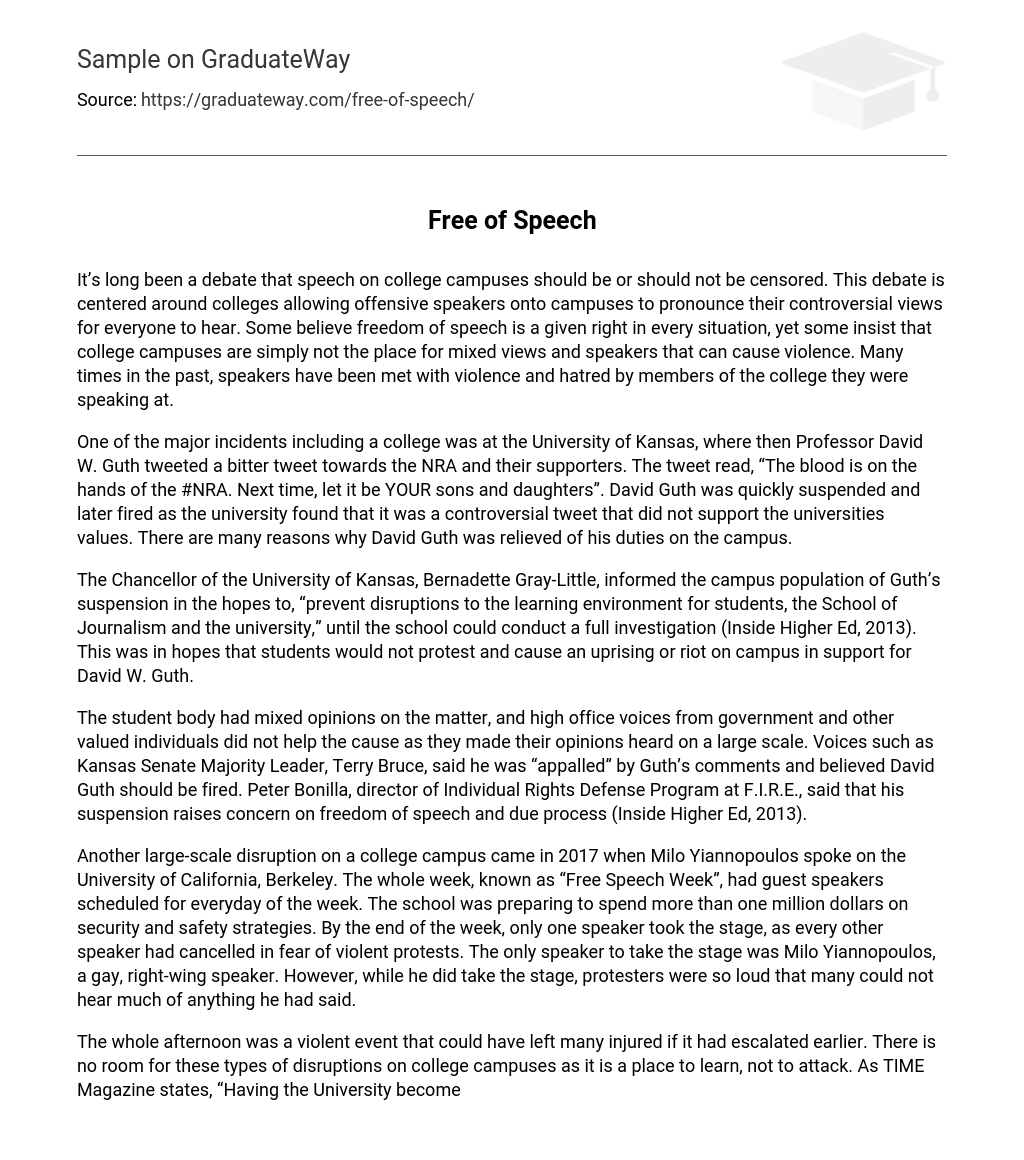It’s long been a debate that speech on college campuses should be or should not be censored. This debate is centered around colleges allowing offensive speakers onto campuses to pronounce their controversial views for everyone to hear. Some believe freedom of speech is a given right in every situation, yet some insist that college campuses are simply not the place for mixed views and speakers that can cause violence. Many times in the past, speakers have been met with violence and hatred by members of the college they were speaking at.
One of the major incidents including a college was at the University of Kansas, where then Professor David W. Guth tweeted a bitter tweet towards the NRA and their supporters. The tweet read, “The blood is on the hands of the #NRA. Next time, let it be YOUR sons and daughters”. David Guth was quickly suspended and later fired as the university found that it was a controversial tweet that did not support the universities values. There are many reasons why David Guth was relieved of his duties on the campus.
The Chancellor of the University of Kansas, Bernadette Gray-Little, informed the campus population of Guth’s suspension in the hopes to, “prevent disruptions to the learning environment for students, the School of Journalism and the university,” until the school could conduct a full investigation (Inside Higher Ed, 2013). This was in hopes that students would not protest and cause an uprising or riot on campus in support for David W. Guth.
The student body had mixed opinions on the matter, and high office voices from government and other valued individuals did not help the cause as they made their opinions heard on a large scale. Voices such as Kansas Senate Majority Leader, Terry Bruce, said he was “appalled” by Guth’s comments and believed David Guth should be fired. Peter Bonilla, director of Individual Rights Defense Program at F.I.R.E., said that his suspension raises concern on freedom of speech and due process (Inside Higher Ed, 2013).
Another large-scale disruption on a college campus came in 2017 when Milo Yiannopoulos spoke on the University of California, Berkeley. The whole week, known as “Free Speech Week”, had guest speakers scheduled for everyday of the week. The school was preparing to spend more than one million dollars on security and safety strategies. By the end of the week, only one speaker took the stage, as every other speaker had cancelled in fear of violent protests. The only speaker to take the stage was Milo Yiannopoulos, a gay, right-wing speaker. However, while he did take the stage, protesters were so loud that many could not hear much of anything he had said.
The whole afternoon was a violent event that could have left many injured if it had escalated earlier. There is no room for these types of disruptions on college campuses as it is a place to learn, not to attack. As TIME Magazine states, “Having the University become a political battleground sometimes makes it seem like the place is “uninhabitable for students”” (TIME Magazine, 2017). Both right and left activists showed that day on campus and many believed it was going to escalate into something violent.
Freedom of Speech is a given right in the United States Constitution; however, I do believe colleges should have the authority to reject speakers that could cause a disruption on campus. Students pay unbelievable amounts of money to attend colleges and universities and should not have to be distracted by protesters of speakers that they didn’t even invite to the campus. The demonstrations can block roads and cause delays making getting to class almost impossible when you’re even slightly late.
I understand that most colleges are public, which means they are funded by the government, but the government should take the student’s and faculty’s safety into consideration when inviting speakers. In today’s time group, such as Antifa, don’t care about any human that does not agree with them. Documentaries and undercover agents have infiltrated these groups and exposed their dangerous tactics. Many branches of Antifa have been recorded spreading illegally acquired weapons and explosives to use against right-wing supporters.
Ultimately, forcing colleges to invite speakers is nonsense as proof of violence on other campuses has been seen by millions. Not to mention, relations on and around campuses can be permanently damaged by conflicting viewpoints. I, myself, have had to cut friendships off as we did not see eye to eye on many things. I feel that a college is even worse as students have to work together as the years pass, and their grades depend on it. Also, professors have full control on how our grades move and a corrupt professor has the power to fail a student.
Sooner, rather than later, some seriously violent event will lash out on a college campus in result of controversial speakers. I’m afraid it will be as serious as the event at, “Charlie Hebdo,” a satirical left-wing magazine based in Paris, France. The magazine spent most of its time ridiculing Islam and its beliefs. That is, until, January 7th, 2015 when two frenchmen attacked the magazine’s offices. As “I Am Not Charlie Hebdo,” says they, “burst into the magazine’s offices, declared themselves members of Al Qaeda in Yemen, shot to death 11 people” (Brooks, 82).
On that day alone, 11 people were shot to death and many more were injured because a magazine had the right to speak what they wanted, and a group did not like it. This event would have been even more of a massacre on a college campus with larger crowds and more protestors. In my opinion, college campuses are just not the sites for controversial speakers. They are a place of education and prosperity. This is where our future is made and it should be a place of peace.





